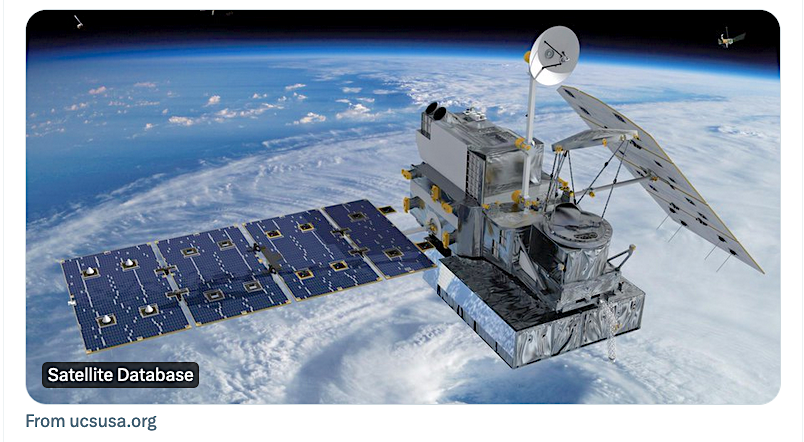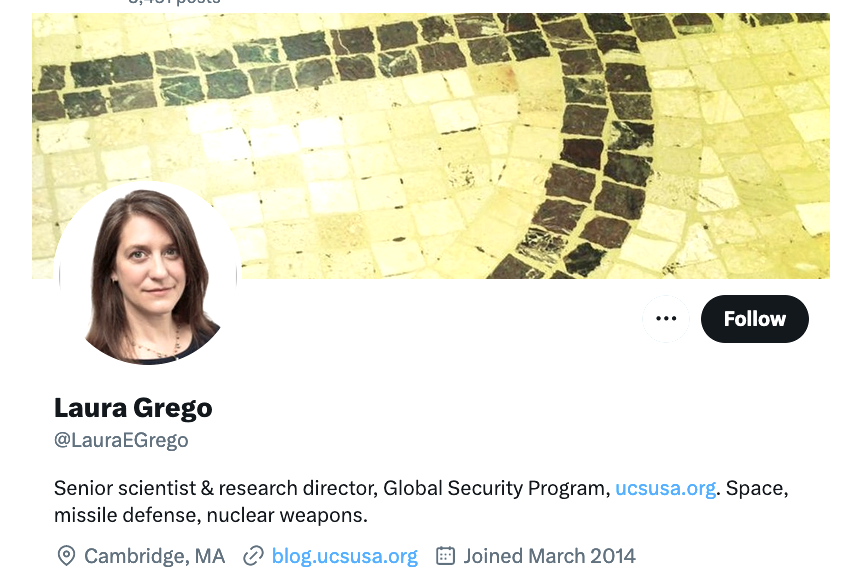
X thread by Dr. Laura Grego’s assessment of a Russian anti-satellite weapon (Image Credit: Sat News)

The following is an X “tweet” threat reacting to the possibility of Russia fielding a space-based anti-satellite weapon that the White House has called “a violation of the Outer Space Treaty” from Dr. Laura Grego, senior scientist and research director for the Global Security Program at the Union of Concerned Scientists. Her work sits at the intersection of space and arms control.
Wednesday, Rep. Mike Turner sounded an alarm about a US intelligence assessment of a Russian anti-satellite weapon. On Thursday, WH National Security Council spokesperson John Kirby said that the ASAT would be “space-based” and would be “a violation of the Outer Space Treaty.”I hope this isn’t accurate, otherwise, it’s shocking. The 1967 OST outlaws stationing of nuclear weapons in orbit, the only specific technology ban it contains. This ban is a no-brainer and has not really been controversial since.
Sometimes people assume that weapons are banned in space. They are not, nor are other nuclear activities banned from space. There’s a long history of satellites powered by radioisotope thermoelectric generators & Soviet/Russian radar satellites powered by nuclear reactors.
Nuclear weapons delivered by ICBMs would transit space for 30 minutes but are not a violation of the OST. That is by treaty design. Whether a Fractional Orbital Bombardment System (FOBS) is a violation of the OST depends on the legal and technical analysis.
CNN reports the weapon as a “nuclear EMP” weapon, and repeatedly refers to it as a “blast” and releasing “charged particles.” Which seems to describe a nuclear explosion. A nuclear blast in space can affect satellites in two ways.
The first is through radiation that travels along the line of sight to satellites. X-rays or gamma rays hit a satellite and create electromagnetic pulses that can burn out sensitive electronics. Charged particles can damage a satellite’s structure and optical components.
All satellites in the line of sight of a nuclear blast could be affected, but the effects decrease with the distance squared, so it’s helpful to remember that GPS satellites and many high value national security satellites are thousands of km away from low earth orbit.
The other effect of a space-based nuclear detonation is not as immediate, but potentially can affect a much larger number of satellites–the introduction of high-energy particles into the existing radiation belts that encircle the earth, the Van Allen belts.
Low-earth orbiting satellites pass through these belts repeatedly, and are built essentially with a radiation “budget” that sets the amount of radiation damage a satellite can accumulate before it is expected to fail.
A high altitude nuclear explosion can add more long-lived energetic particles to these belts, increasing the rate by which this radiation budget is eaten up, potentially quite drastically. This has the potential to affect a large number of satellites.
It is very important to note that the effects of the detonation of a nuclear weapon in space would be indiscriminate. When the US conducted the Starfish Prime nuclear test in 1962, detonating a 1.4 megaton nuclear weapon at 400 km altitude, only 24 satellites were in orbit.
…or launched shortly after, and it damaged eight of them. Today i, there are nearly 7,000 satellites operating in LEO alone.

Of course, if a nuclear weapon were detonated in space, it would be a best case scenario to be worried about the long term effects on satellites. Any use of a nuclear weapon presents enormous risks of further use and nuclear war, which would be catastrophic.
Reporting says the weapon contravenes the OST, not just that it has a nuclear characteristic. Starfish Prime & tests like it were nuclear weapons lofted on missiles. There are many reasons NOT to leave a nuclear weapon orbiting in space besides being against international law.
You lose control of a nuclear weapon that is in orbit in substantial ways—you cannot inspect or maintain it, it could be hit by debris, it could have a system failure, it cannot be retrieved, you’ll need to worry about hacking/jamming of command and control.

I hope that this intelligence report or the public comments and reporting are inaccurate, both about Russia even considering stationing a nuclear weapon in space or of Russia considering operationalizing a plan to detonate a weapon in outer space.





